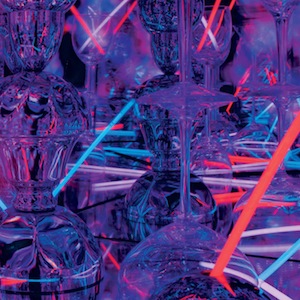Tom Trago The Light Fantastic
Tom Trago is the kind of producer who’s unafraid to mix things up stylistically. Over […]

Tom Trago is the kind of producer who’s unafraid to mix things up stylistically. Over the past few years, his discography has included a surprising degree of variation, especially considering he’s most known for his explosive, sample-based disco-house material. Nowhere has this diversity been more apparent than on his albums, which, though cohesive as works on their own, have served as a way for him to stretch out and show off the extent of his interests. His latest LP, The Light Fantastic, is his third so far, and while it’s billed as a return to the more focused rootsy dancefloor divaism of his 2009 debut, Voyage Direct, in actuality, it might be his most eclectic effort yet.
With that said, it’s also obviously a record made with the concerns of a dancefloor in mind. Across its 10-track, hour-long expanse, Trago tries his hand at a number of variations on the basic theme of house, rarely dipping below its requisite 120 bpm. As the record progresses, he moves from the sheen of modern, club-oriented deep house, through ’80s Chicago jack tracks, and then heads straight back into his signature bombastic disco samples.
The album takes a while to get going, as it frustratingly leads with some of its weakest material. Things start promisingly enough with the short, two-minute dancefloor invocation of “The Light Fantastic,” a mostly kick-less track that entices the listener into the LP with warm organ stabs and bits of chopped-up vocals. Then comes “True Friends” and “For the Children,” which are similar in the way they pair meaningless vocal chanting with repetitive instrumentation—in both cases, one gets the sensation that the vocals were added last minute, as a finishing touch in lieu of some other, more considered approach. This recurs across the album, in some cases taking a turn towards the cringe-worthy. For example, on “Jack Me,” Trago’s porny ode to (and simulacrum of) ’80s-era Trax Records, he has an unnamed female vocalist coo, “Do you remember Jamie?/What he used to say?/Baby wants to ride.” This might work for a certain kind of boozy dancefloor, but it just comes off as lazy in most other contexts.
Thankfully, after its up-and-down beginning, the record gets a lot better. “Cosmic Blacksmith” picks up the slack, with a deadstock take on acid house that revolves around an almost 8-bit 303 bassline that arpeggiates and repeats, propelling the track through a linear arrangement with sections of clanging cowbell, heavy digital processing, and lush, tension-inducing pads. It’s simple but effective, and acts as a bridge between the vocal material and the more interesting instrumental constructions of the LP’s second half. Next up is “The Elite,” a tracky DJ tool that sees Trago distill a jazzy orchestral tune into a stab-a-thon, complete with jit-worthy monotone hits that slap against a stripped-down four-to-the-floor, occasionally resetting with a full play of the organic sample itself.
Unsurprisingly, the LP’s best moment comes via “Two Together,” a collaboration with Steffi and its one real attempt at disco house. The hook is built around a creative re-interpretation of Goody Goody’s “It Looks Like Love,” an underground classic from 1978. Trago takes the bassline and guitar, adds some Rhodes, and loops it mercilessly, changing it on the fly, while adding simple bits of synthesizer that weren’t in the original song. The result is reminiscent of the madcap approach of old-school, mid-’90s Roulé—it’s lighthearted, but while it doesn’t take itself too seriously, it also doesn’t sacrifice anything in its appeal to the dancefloor, either.
Trago keeps the disco vibe going with “The Wrong Right,” a shuffling Latin drum track that breaks halfway through to make space for overjoyed piano vamping. He then finishes with “I Still Desire,” the lone vocal track on the LP that truly works, combining vocoder musings with a Dutch-electro ambiance that sounds totally out of leftfield next to the more standard four-to-the-floor house that populates the rest of the LP. It’s an incongruous end, but one that seems oddly fitting for a record as scattershot as this.

